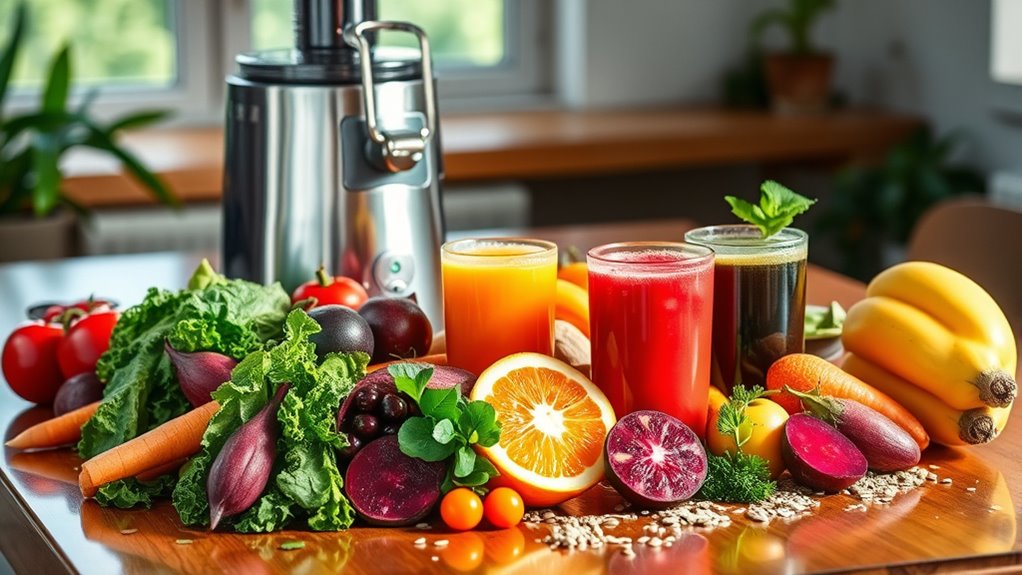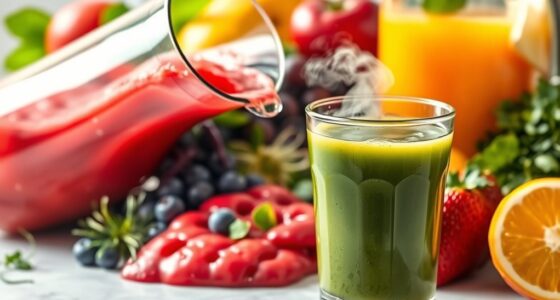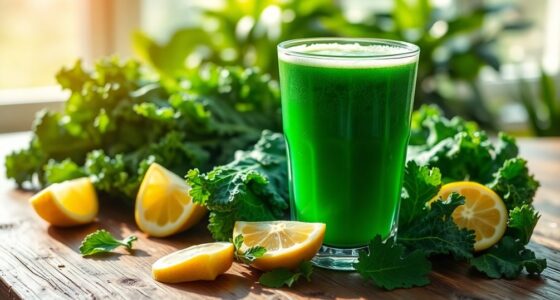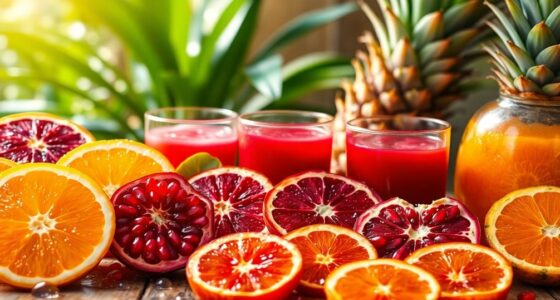Juicing can be a powerful way to boost your nutrient intake and may help lower cancer risk if done correctly. It offers concentrated vitamins and antioxidants, but it shouldn’t replace a balanced diet. Relying solely on juice can strip essential fiber and nutrients. To maximize benefits, focus on a mix of fruits and vegetables. Remember, whole foods are vital for overall health. Stick with us as we uncover more about juicing and its impact on your health!
Key Takeaways
- Juicing extracts concentrated nutrients, providing vitamins, minerals, and antioxidants that support overall health and may lower cancer risks.
- A balanced juice should have a 1:1 ratio of fruits to vegetables for optimal nutrient diversity and effectiveness.
- While juicing offers health benefits, it is not a substitute for evidence-based cancer treatments and should complement a well-rounded diet.
- Consuming dark leafy greens and colorful fruits boosts antioxidant intake, which is vital for cancer prevention.
- Relying solely on juicing can lead to malnutrition; a balanced diet with fiber and protein is essential for cancer recovery and health.
Understanding Juicing and Its Nutritional Impact
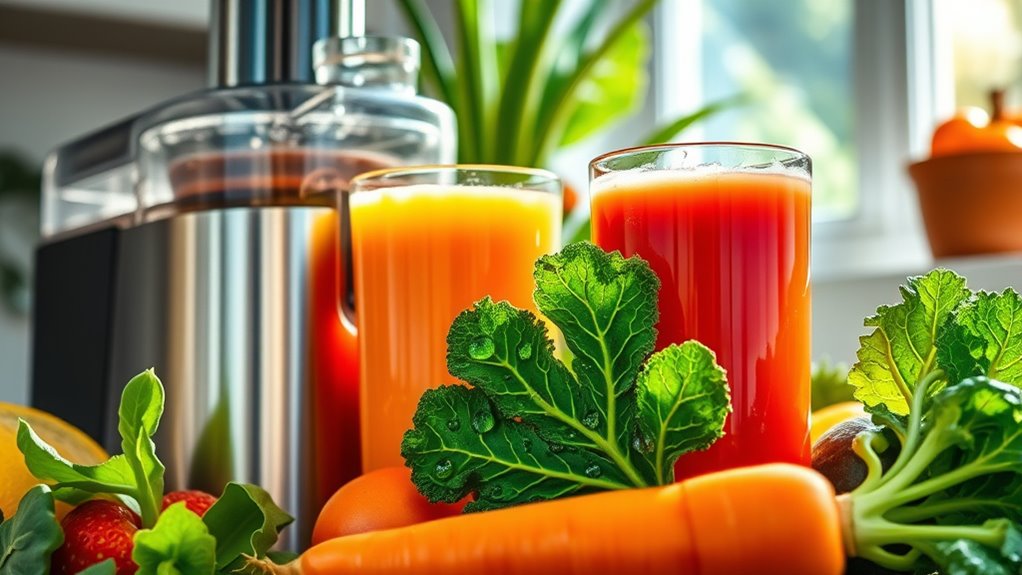
When you explore juicing, you’ll find it extracts concentrated nutrients from fruits and vegetables, offering a potent source of vitamins, minerals, and antioxidants that can be beneficial for your health.
Scientific evidence suggests that, when done correctly, juicing may help lower cancer risks. However, keep in mind that juicing removes essential fiber, which is vital for digestive health and satiety.
Cancer patients, in particular, should be cautious, as they might face a greater risk of deficiencies. To maximize health benefits, aim for a balanced juice with a 1:1 ratio of fruits to vegetables, incorporating a variety of colorful options. This approach not only enhances nutrient diversity but also supports overall wellness alongside whole food consumption. Furthermore, juicing with a Ninja Blender can provide a smooth consistency that makes it easier to integrate various fruits and vegetables into your diet.
The Myths Surrounding Juicing and Cancer
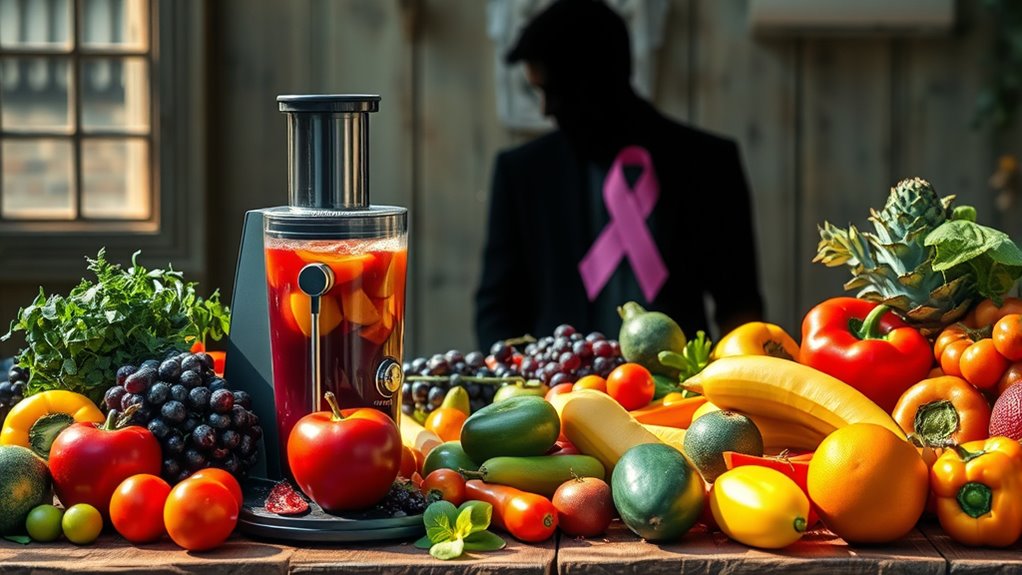
Juicing can offer a burst of vitamins and antioxidants, but it’s important to separate fact from fiction, especially regarding cancer. Many myths surround juicing, suggesting it can cure cancer or greatly lower your risk.
The reality is, while juicing provides some benefits, there’s no scientific evidence supporting it as a cancer cure compared to a balanced diet rich in whole fruits and vegetables. Extreme juicing diets can lead to malnutrition, depriving you of essential nutrients like fiber and protein. Misinformation spreads quickly on social media, often targeting those desperate for solutions.
Relying solely on juicing can divert you from evidence-based medical treatments, potentially worsening your health outcomes. Additionally, incorporating meal replacement juices can provide essential nutrients while reducing calorie intake, which is beneficial for overall health. Stay informed and prioritize a balanced approach for cancer prevention and treatment.
Essential Nutrients for Cancer Patients
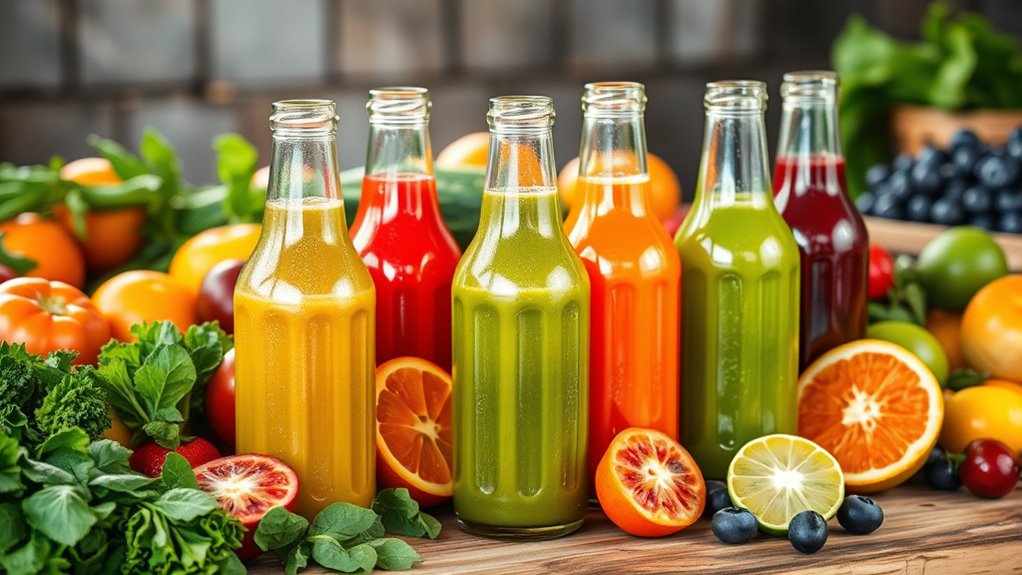
Cancer patients require a well-rounded diet to support their recovery and overall health. Focusing on whole grains, fruits and veggies, and other nutrient-dense options helps provide essential vitamins and minerals.
Incorporating dark green leafy vegetables and tropical fruits can boost your antioxidant intake, which is beneficial for fighting cancer. Aim for at least 25-40 grams of dietary fiber daily to promote digestive health and help maintain a healthy weight. Whole grains and legumes are excellent sources of fiber, adding further nutritional support. Additionally, a juice cleanse can provide a concentrated source of vitamins and antioxidants that may enhance overall wellness and support the immune system.
The Risks of Relying Solely on Juicing
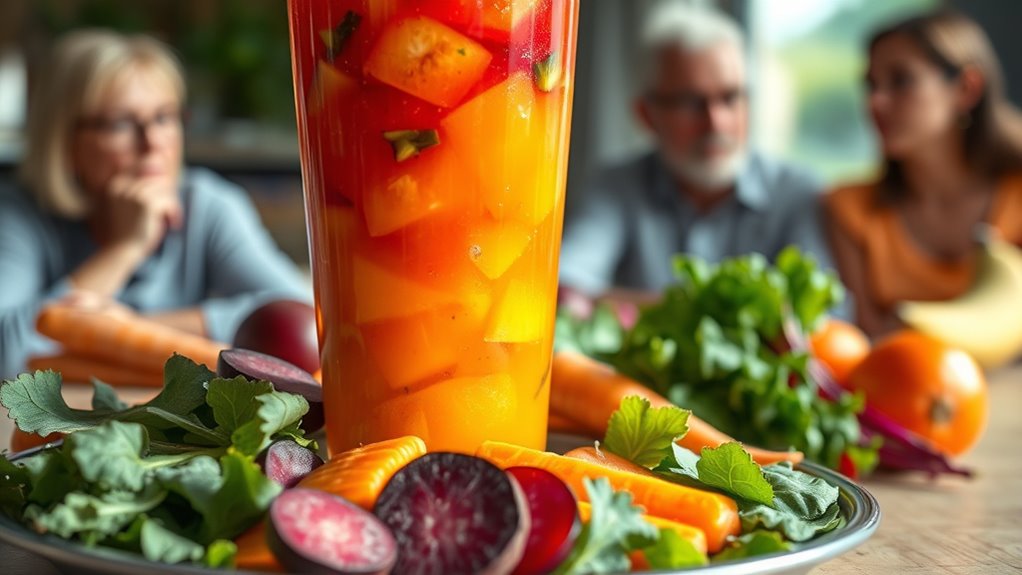
Focusing on a nutrient-rich diet is essential for cancer patients, but some individuals may be tempted to rely solely on juicing as a quick fix. This approach can lead to severe malnutrition, as juicing strips away essential nutrients found in whole foods.
- Lack of fiber can hinder digestion and increase hunger, leading to unhealthy eating habits.
- Without adequate protein and healthy fats, your body struggles to repair itself, affecting overall health.
- Claims of juicing as a miracle cure for cancer are unsupported by evidence, distracting you from effective treatments.
As a cancer survivor, it’s vital to prioritize a balanced diet to truly reduce the risk of complications, rather than relying solely on juices. Additionally, incorporating antioxidants found in whole foods can further support your health and well-being during recovery.
Recommended Dietary Practices for Cancer Prevention
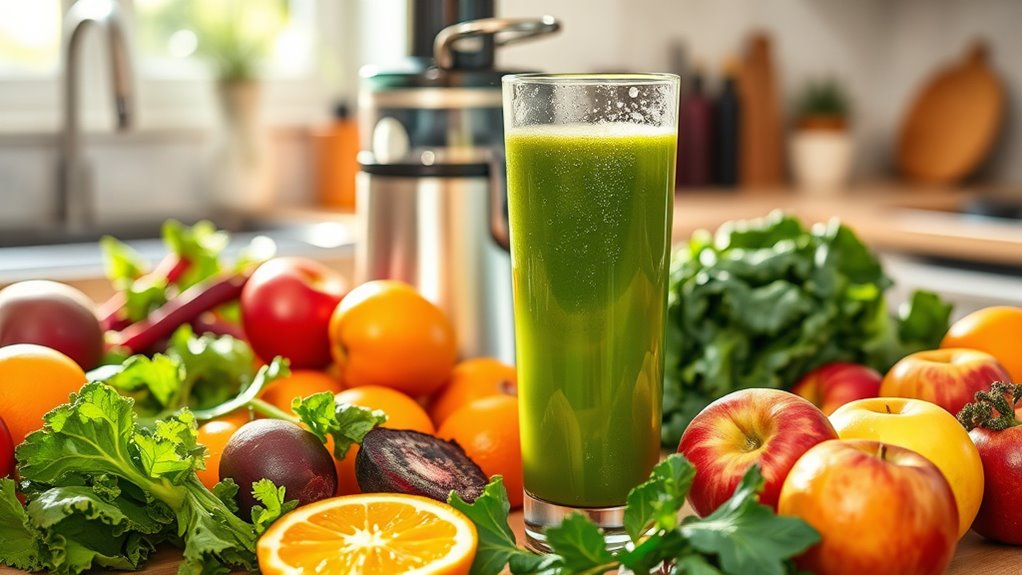
A nutrient-rich diet plays an essential role in lowering your cancer risk and promoting overall health. According to cancer research, aiming for at least 2 1/2 cups of fruits and leafy vegetables daily can greatly reduce your risk.
Incorporate a variety of colorful, nutrient-dense produce, like dark leafy greens and tropical fruits, to maximize your vitamin, mineral, and antioxidant intake. Fiber from whole fruits and vegetables supports digestive health and helps maintain a healthy weight—key factors in cancer prevention. Additionally, the inclusion of unique homemade fruit juice recipes can provide a delicious way to boost your nutrient intake.
While the benefits of juicing can enhance your diet, remember it should complement whole foods. Balance your meals with whole grains and lean proteins to support wellness and further lower your risk of cancer recurrence.
Frequently Asked Questions
What Kills Cancer Cells Naturally in the Body?
Your body has powerful defenses against cancer cells. It utilizes your immune system, particularly T-cells and natural killer cells, to identify and destroy these abnormal cells.
Consuming antioxidants from fruits and vegetables helps neutralize harmful free radicals, while nutrients like vitamin D and omega-3 fatty acids support immune function.
Phytochemicals found in plant foods also contribute by modulating cell signaling pathways, enhancing your body’s natural ability to fight off cancer effectively.
What Is the Number One Fruit for Cancer Fighting?
When it comes to cancer-fighting fruits, blueberries often take the top spot. Their high levels of antioxidants, particularly anthocyanins, help combat oxidative stress in your body.
Incorporating these berries into your diet can’t only boost your overall health but also lower your risk of certain cancers, like breast and colon cancer.
What Foods Stop Cancer Cells From Growing?
Imagine a garden where vibrant fruits and vegetables thrive, each one a warrior against cancer. To stop cancer cells from growing, you’ll want to fill your plate with colorful produce like berries, leafy greens, and cruciferous vegetables.
Incorporate tomatoes for their lycopene and garlic for its allicin. Don’t forget whole grains and legumes for fiber, and spices like turmeric for their healing power.
Together, these foods create a shield, bolstering your body’s defenses.
What Stops Cancer Cells From Growing?
To stop cancer cells from growing, you need to focus on a nutrient-rich diet. Incorporate plenty of fruits and vegetables, especially those high in antioxidants, vitamins, and phytochemicals.
Foods like broccoli, kale, and carrots are particularly effective. They contain compounds that help neutralize free radicals and promote cell health.
Regularly consuming a variety of these plant-based foods can enhance your immune function and support your body’s ability to combat cancer cell growth.
Conclusion
So, while you might think that sipping on a green juice is your golden ticket to dodging cancer, remember that it’s not a magic potion. Sure, those vibrant veggies pack a punch, but they can’t replace a balanced diet. Ironically, you could end up with a nutrient deficiency if you rely solely on juicing. Embrace the juice as a tasty sidekick, not the superhero of your diet. Balance is key—after all, even superheroes need their sidekicks to thrive!
Cindy thoroughly researches juicing trends, techniques, and recipes to provide readers with practical advice and inspiration. Her writing style is accessible, engaging, and designed to make complex concepts easy to understand. Cindy’s dedication to promoting the advantages of juicing shines through her work, empowering readers to make positive changes in their lives through the simple act of juicing.

